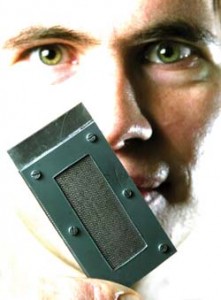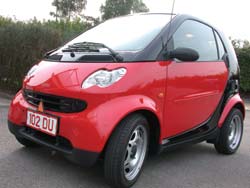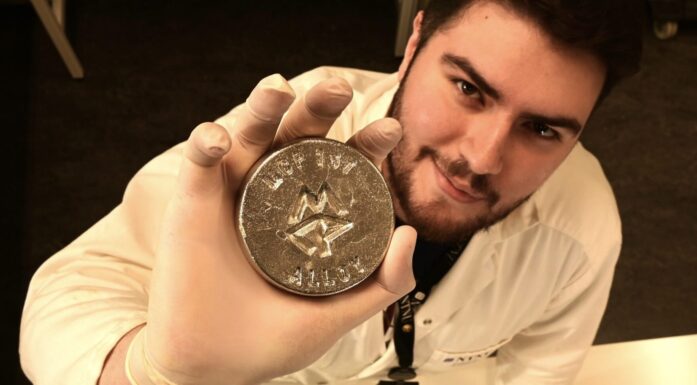Tough little electric car
The first thing that the scientists did was to build a mobile phone battery that runs on metal plates and air. Now a somewhat larger version is on the way – for electric cars!
Perhaps you have seen it on the road in other countries – Daimler Benz’s popular Smart Car? This little diesel car has been a success ever since it was launched. Now SINTEF is going to make it even smarter: in a few months this car will be running on little more than air and electricity.
So far, the new battery technology has been tested in mobile phones. It functioned so well that the scientists are going to develop the battery for the little city car known as Smart Car.
“Technically, this is a hybrid battery and fuel cell. It uses the energy that is released when zinc reacts with air”, explains SINTEF project manager Trygve Burchardt.
How the “battery” works

Mobile battery: Trygve Burchardt’s fuel cell invention has been tested on mobile telephones. Now the battery is being further developed for use in electric cars.
Photo: Rune Petter Ness
The fuel cell consists of two lattice-like plates known as air electrodes, with a zinc plate between them. Oxygen infiltrates the porous structure of the air electrodes, with which it reacts, forming the positive pole of the fuel-cell battery. At the opposite pole, the zinc starts to corrode, liberating energy as part of an electrochemical process. This energy is captured by connecting the two poles in an electric circuit. When the zinc plate has been depleted of energy, that is, when it has been completely converted into zinc oxide, the process can be reversed simply by reversing the polarity of the reactions. At one electrode, zinc is re-formed from the zinc oxide, while the other electrode releases oxygen, which is removed from the system.
“This means that the battery can be charged quite simply, just like traditional batteries. In order to improve its user-friendliness the project team is now hard at work on rapid charging and on increasing the number of times that the system can be charged without loss of energy. We still have some way to go here, but we have already obtained very promising results”, says Burchardt.
The new car battery system will consist of a number of zinc plates connected in series, and will be neither bigger nor heavier than the battery systems used in present-day electric cars.
Longer range
As well as creating an unusually environmentally friendly vehicle, the scientists believe that they can significantly increase the range of the electric car. Their aim is that it should be able to run for at least 200 kilometres on a full charge, in comparison with a present-day car, which can only manage 70 km before it needs to be recharged.
“This little ‘tough guy’ was originally a little diesel car, but we have removed its diesel engine and installed an environmentally friendly electric motor. This has enabled us to create an aggressive little car that accelerates from 0 to 100 kilometres per hour in only ten seconds”, says Burchardt.
One of the challenges facing the scientists, therefore, will be to keep the good “condition” of the vehicle while increasing its range. The smart car has been provided by Daimler Benz. The English company Zytek has developed the electric motor and gear, and the Norwegian company Miljøbil Grenland is contributing its operational experience. This company already has a fleet of 200 electric cars operating in Norway and it will be responsible for commercialization if the project is successful.
Stricter environmental standards
The timing of the launch of the new battery may well be perfect: in 2005, the “classic” electric car nickel-cadmium batteries will be subject to strict environmental standards – precisely because they use cadmium. The new batteries will not have problems of this sort because they do not use materials that are hazardous to health or the environment.
“We have a great deal of faith in the future of the electric car market. Just look at sales in Oslo, where the number of electric cars has exploded since the authorities allowed electric cars to drive in bus and taxi lanes. If we can just manage to increase the range to 200 km, we believe that the market will become even larger”, says Trygve Burchardt.
The project team aims to produce a battery system for electric cars at a cost that will be competitive in the current battery market, which is to say that it must not cost more than NOK 60,000. Miljøbil Grenland has bought the rights to the new system and will be responsible for selling what may turn out to be the smartest Smart Car in the world.
By Christina B. Winge





